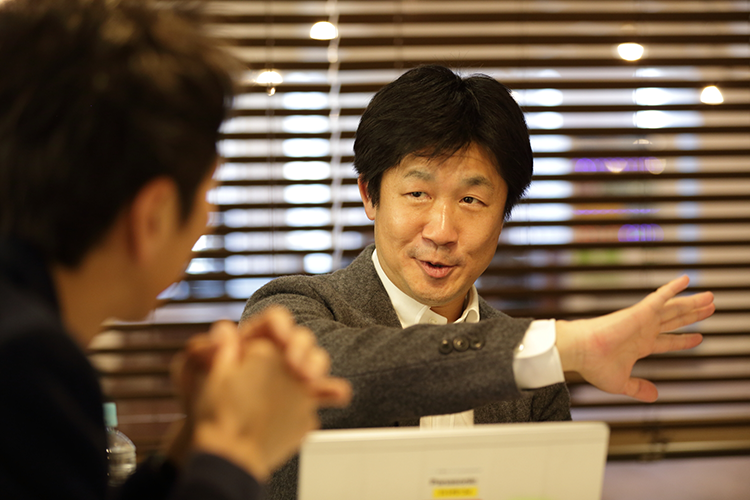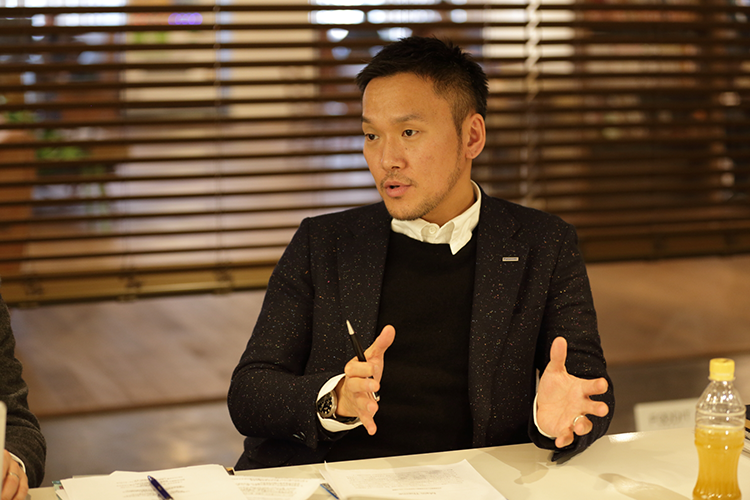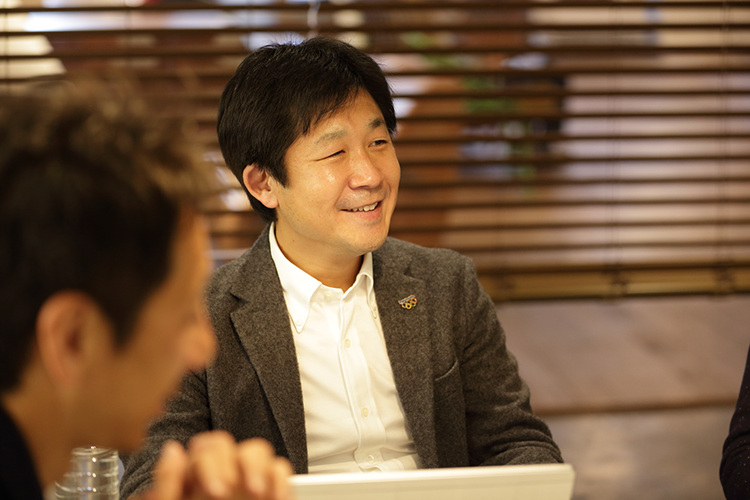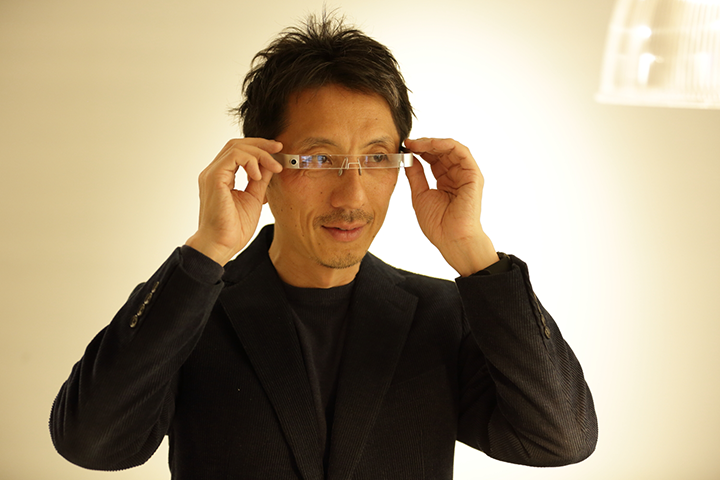If this situation continues, "that familiar taste of the familiar restaurant" may be lost. Unexpectedly, Japan's food and drink service industry faces an unprecedented "shortage of workers".
"Kronosys" came up with a "training solution" for restaurant kitchen operations by using smart glasses. By guiding through "cooking basics" such as kitchen knife sharpening method and cooking method shown on the smart glasses, they provide information such as time and timing whenever necessary and provide training remotely or closely so that individual skills will improve.
 Kronosys was exhibited in SXSW 2018
Kronosys was exhibited in SXSW 2018
The entrepreneur Hitoshi Nakamura, who is the CEO of Toreta, Inc., was also one of those who had an idea about revolutionizing of the food service establishments. "Toreta" is a reservation and customer management service for restaurants where customer information can be managed and analyzed with data by managing reservations with applications in tablets. With Kronosys through "cooking" and Toreta through "reservation", they both carry a mission to "provide important information for food and drink service establishments" although the area in which two entities enter the market may be different.
Both large companies and venture companies face challenges. From the viewpoints of both, will discuss "IoT and the future of the food and drink service industry" will be discussed with Hideki Arii and Norihisa Matsuda from the Kronosys development team.
 (From Left to Right)Hitoshi Nakamura (Toreta) , Hideki Arii and Hironori Matsuda (Kronosys Development Team)
(From Left to Right)Hitoshi Nakamura (Toreta) , Hideki Arii and Hironori Matsuda (Kronosys Development Team)
Why "Labor Reduction" is Necessary in the Food and Drink Service Industry
Arii: In today's restaurant businesses, it has become difficult to hire workers due to the strong impression that the business involves "long working hours". Even if new full-time employees and temp workers are hired, the turnover rate is high. Efficiency is necessary in restaurants, but the reality is that there are no solutions to this utilizing technology.
Nakamura: Restaurant businesses indeed tend to have long working hours. In addition to the works during the operation hours, there are basically so many other things to do such as inventory management and menu development. Those who work at restaurants joined the establishments to be involved in "hospitality" but if they are able to interact with customers for only 30 minutes of the more than 12 working hours per day, their motivations will inevitably go down.
 Hitoshi Nakamura (Toreta)
Hitoshi Nakamura (Toreta)
Arii: We have also witnessed such reality. We are in the department where we install equipment in restaurants, but we feel that the challenges facing the actual work place cannot be solved with kitchen equipment design. Kronosys was born out of the thinking that perhaps IT can be incorporated into the kitchen system itself.
 Hideki Arii (Panasonic Kronosys Development Team)
Hideki Arii (Panasonic Kronosys Development Team)
What is the "Added Value" of Foods and Drinks for the Future of Restaurant Digitalization?
Nakamura:There are many simple tasks that can be replaced with technology, but on the other hand, omotenashi, the Japanese spirit of hospitality, can be considered a type of "vain" when considering efficiency. But it is also true that such "extra time and effort" can bring added value to the restaurant businesses. So, we have to think about raising the value of areas where people come into play.
Matsuda:You are right. There is also a big challenge of whether the IT tools will be used when brought into the food and drink service establishments. There are those who can adapt immediately and those who cannot adapt so easily to such tools. How is Toreta addressing these issues with the restaurants?
 Norihisa Matsuda (Panasonic Kronosys Development Team)
Norihisa Matsuda (Panasonic Kronosys Development Team)
Nakamura:What we learned from installing these tools in many restaurants is that, in order for these IT tools to take hold as part of the establishments, there cannot be one extra button to increase the amount of work to be done. We will be told, "We're already too busy, please don't bring something that will add more to our burden!" No matter how great the tool is, if it doesn't provide the same amount of work or even better, less amount of work, then they will not be used. We have been providing support to those who decided to install our Toreta system until they get used to it and do away with paper ledgers. Even if it is a simple and easy application to use, it will still be necessary for someone to be on hand to be able to actually use it.

Food and Drink Services Have Also Entered the Era of Big Data. In the Near Future, Cooking Data Will Also Become "Intellectual Properties"
Nakamura:When Kronosys is used in the kitchen, it will be possible to collect data on the cooking process. A data such as "How fast and to how many centimeters will the food be cut with which knife" can be collected and it could be interesting if the cooking process can be recreated with these data. There are many recipe data out there but there is pretty much no data on the cooking process. Technically, if sensors are placed on cooking utensils such as knives, frying pans and chopping boards, then such data can be collected. When all these cooking data are collected, then they can become "intellectual properties."
Arii:It will be a dream come true for cooks if one can recreate the taste of certain restaurant all over the world. Currently, I understand that Toreta is analyzing big data. Which types of data are you dealing with?
Nakamura:We are currently analyzing open seats and customer data. We will be able to provide information on "when, at which restaurant, and how many seats will be open" through data on open seats linked with online reservation. As for customer data, for example, we will be able to know how many times a customer has been to a certain restaurant and will also be able to know what types of customers become regulars at a certain restaurant. Therefore, we will be able to see the movement pattern of customers. These information gets linked to future sales and by utilizing these data efficiently, we will be able to forecast demands for these establishments.
Matsuda:If customer data from Toreta is transmitted to Kronosys, that could be interesting. The hall staff with Kronosys on can check how often a certain patron come and what they ordered previously. If that becomes possible, then there will be more room for creativity in rather uniform services.
Nakamura:In restaurants that hire large numbers of personnel, how to encourage creativity of each individual staff has always been a big issue. But if standardized methods are adopted for efficient operations and uniform services, then there will be a lack of "humanness" from the services. But if important information can be collected on site through smart glasses, then the relationships between the patrons and hall staff can become more engaging through technology.
There is No Venture or Large Companies When It Comes to Solving the "Industry's Challenges"
Arii: After hearing your advice, I feel that the range in which Kronosys can contribute has broadened. But what we should preserve is the "taste" of Japan. By Kronosys supporting the cooks, we hope to hand down the recipes and cooking methods of distinctive cuisines.
Nakamura:I agree wholeheartedly. "Solving the problems of an industry" is also what Toreta's business is about. There aren't so many companies that are trying to solve the issues facing the food and drink service industry with technology. There are services for end users such as gourmet guide sites but there are still ways to go when it comes to solving issues facing the restaurants through business-to-business involvement.
Matsuda:We feel that we are contributing to a small part of the food and drink service industry. Because we are taking a third-party stance, we are able to see areas where changes need to happen free from prejudice, and we feel we can change the situation.
Nakamura:Because I have been involved in the restaurant operations, there are many issues in the food and drink service industry. That is why I sympathize with Kronosys' approach to tackling big issues of the industry straight on. It doesn't matter if an organization is a venture company or a large corporate company. Let's contribute to the food and drink service industry together.





